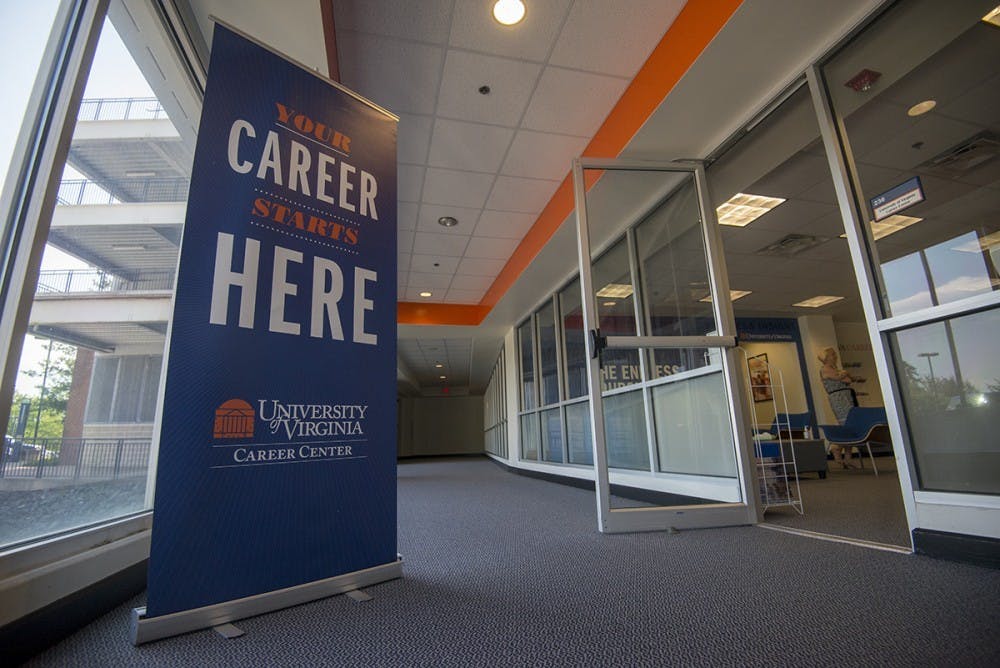The Internship Placement Program from the University’s Career Center and the Office of the Provost has placed University students with both paid and unpaid internships in the Charlottesville area for over 40 years. Based on student’s career interests, admitted applicants can be matched with one of 300 internships that the center sponsors with for a summer, semester or academic-year long program.
Throughout the program’s existence, the Career Center has collected an array of sponsors to offer internships for students in both the public and private sectors. These sponsors include Planned Parenthood, Albemarle County Public Schools, the Alzheimer’s Association and Paladin Media Group.
According to Kimberly Harrison Link, the assoc. director of the IPP, the program is specifically focused on supporting students in the College. They application is open to students of any year, but preference is given to upperclassmen.
The IPP requires that students commit 10 hours per week to the internship during the academic year and 20 hours per week during the summer. In addition, students in the program are required to enroll in a one-credit course at some point during the school year and the course is intended to reflect on and enhance each student’s internship experience. Students apply for the program between Jan. 21 and March 1.
Kerry Bush, a third-year Curry student and IPP participant, matched with an internship in UVAHS Clinical Research. According to Bush, each aspect of the experience, including the application process, was “worth anyone’s time and investment.”
“It’s a great way to meet other people from the organization that I wouldn’t have met otherwise,” Bush said. “It’s really cool to get to know people that are in law or are in marketing or are doing x, y, or z through the program as well.”
The application process for the program involves writing three personal statements, ranking five preferred internships, paying an application fee and interviewing with IPP staff and potential employers. The application fee of $95 but is able to be waived if proven necessary for the student through demonstrated financial need.
“I wasn't pleased by the idea of having to pay to gain experience,” Saloni Mittal, a second-year College student and IPP participant, said in an email to The Cavalier Daily. “I wish I could have taken more actions to get a fee waiver.”
According to Link, the Career Center is currently reevaluating the application fee, as they believe “the application fee should not be a barrier for applying.”
“We are certainly going to be taking a look at some of our student data in terms of inquiries and students who perhaps opted not to apply and reasons they chose not to apply,” Link said. “I can tell you it is a pretty generous fee waiver process, and we process fee waivers weekly for students.”
The purpose behind the application process and the multiple interviews within it is to assess the interests of the student and the readiness of that student to have an internship. According to Link, every part of the program is “to support student development.”
To Bush, the multi-step interview process helped her grow comfortable with the program and helped the Career Center get to know her better as a person.
“[The interview process] was really helpful, especially the way that they did it for my specific field,” Bush said. “First interviewing with [Link] and the Career Center so they get a sense of who you are and what you’re interested in doing, and then they can help reference you and give you feedback about how you interviewed.”
Bush ultimately said that for her, the entire process “was really helpful getting that type of security.”
While the IPP matches many students with fitting internships, it does not guarantee placement for all students. In last year’s summer program, the IPP matched 87 students with summer internships, and about 87 students for the current year’s academic session as well. About 300 applications were received, and students who were not successfully placed were either denied chose to defer placement or refused the internship they received.
According to Link, IPP has better results placing students in certain sectors than others because of the partnerships they currently have. Specifically, non-profit jobs and public service have the highest rates of student placement because the center has the most sponsors in those areas.
“Private industry partners typically recruit with the Career Center through more traditional, non-placement program options, so mostly public sector and non-profit, across various roles however,” Link said.
Currently, the Career Center is hoping to expand their internship opportunities outside of the Charlottesville area. Last academic year, they began matching students with internships at the Library of Congress — a program which they doubled in size this year — and in the future, they hope to send more students to Washington D.C. through that program.
Both Bush and Mittal said that the University should improve their efforts to provide students with credit hours for the time they spend at their internships. Both said the additional one-credit class did not match the hours they put into their internships.
“The only recommendation I'd have is to make the class worth more credits,” Mittal said. “Since it's already a 10-hour time commitment, it doesn't seem evenly matched to have only a 1 credit class.”







